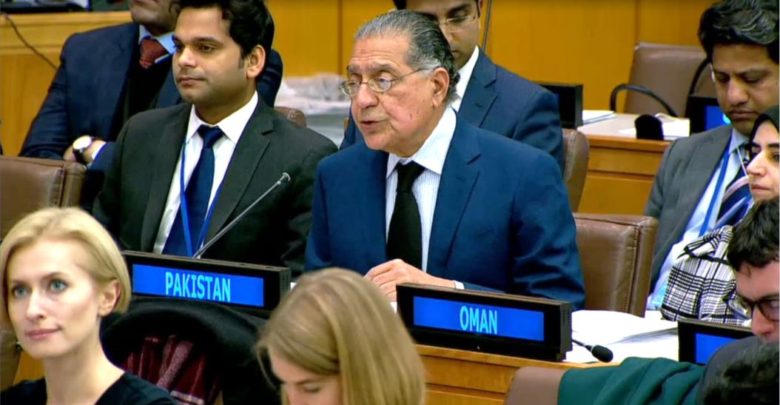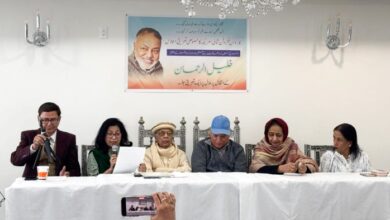اقوام متحدہ میں پاکستان کی حق خودارادیت کی حمایت میں قرارداد اتفاق رائے سے منظور
پاکستانی قرارداد کو ۸۱ ممالک کی حمایت حاصل رہی ۔ قرارداد اقوام متحدہ میں پاکستان کے مستقل مندوب منیر اکرم نے پیش کی

نیویارک (محسن ظہیر سے ) اقوام متحدہ جنرل اسمبلی نے پاکستان کی جانب سے حق خودارادیت کی حمایت میں قرارداد اتفاق رائے سے منظور کر لی۔ پاکستانی قرارداد کو ۸۱ ممالک کی حمایت حاصل رہی ۔ قرارداد اقوام متحدہ میں پاکستان کے مستقل مندوب منیر اکرم نے پیش کی۔ قرارداد نو آبادیاتی تسلط، بیرونی قبضے اور غیر قانونی جارحیت کا شکار تمام لوگوں کو حق خودارادیت کا حق دینے کا مطالبہ کرتی ہے۔
اقوام متحدہ سے خطاب کرتے ہوئے منیر اکرم کا کہنا تھا کہ حق خودارادیت کا مطالبہ کرنے والے عوام کی ہر ممکن مدد کرنا عالمی برادری کی اولین ذمہ داری ہے۔ کوئی بھی ملک جارحیت ، کرفیوز اور غیر قانونی پابندیاں لگا کر مقبوضہ علاقوں میں عوام کا حق خودارادیت غصب نہیں کر سکتا۔
منیر اکرم نے مزید کہا کہ جنرل اسمبلی اور سلامتی کونسل کی کئی قرادادیں مقبوضہ علاقوں کے عوام کا انکا حق خودارادیت دیتی ہیں۔انہوں نے مزید کہا کہ حق خودارادیت اقوام متحدہ چارٹر اور مروجہ بین القوامی قوانین میں ایک رہنما اصول کی حیثیت رکھتا ہے۔
یہ بھی پڑھیں:اقوام متحدہ میں پاکستان کی حق خودارادیت کی حمایت میں قرارداد اتفاق رائے سے منظور https://thepakistaninewspaper.com/pakistan-questions-indias-eligibility-for-unscs-membership/
At UN, Pakistan’s resolution reaffirming peoples’ self-determination right adopted unanimously
IFTIKHAR ALI
UNITED NATIONS, Nov 20 (APP): A key committee of the UN General Assembly Tuesday unanimously passed a Pakistan-sponsored resolution reaffirming the right to self-determination for peoples who are subjected to colonial, foreign and alien occupation.
Co-sponsored by 81 countries from all over the world, the resolution was adopted without a vote in the 193-member Assembly’s Third Committee, which deals with Social, humanitarian and cultural issues.
The resolution, which Pakistan has been tabling since 1981, serves to focus the world’s attention on the struggle by peoples for their inalienable right to self-determination, including those in Kashmir and Palestine.
It is expected to come up for General Assembly’s endorsement next month.
Under the terms of the draft, the General Assembly would reaffirm the universal realization of the rights of all peoples, including those under colonial, foreign and alien domination, to self-determination as a fundamental condition for the effective guarantee and observance of human rights.
The resolution also declared the General Assembly’s firm opposition to acts of foreign military intervention, aggression and occupation, since these have resulted in the suppression of the right of peoples to self-determination and other human rights in certain parts of the world.
It called on those States responsible to cease immediately their military intervention in and occupation of foreign countries and territories, as well as all acts of repression, discrimination, exploitation and maltreatment.
Presenting the draft, Pakistan’s UN Ambassador Munir Akram highlighted the importance of the right of self-determination that enjoys primacy in international law as well as the fact that it is the fundamental principle of the UN Charter and two international Covenants.
“Peoples who have been promised the free exercise of a decision on their own political future are obviously embodied to the rights to self-determination,” the Pakistani envoy told the committee.
He said that General Assembly’s resolution 2649 of 1970, reaffirmed by several Security Council resolutions, regarded the acquisition and retention of territory in contravention of the right of the peoples of that territory to self-determination as gross violation of the Charter.
“Certainly, attempts to unilaterally change the status of the territory which have yet to exercise their right to self-determination are illegal,” Ambassador Akram said, in an obvious reference to India’s annexation of Jammu and Kashmir on August 5 when the disputed state was placed under a repressive lockdown with internet and phone communications cutoff.
He went on to point out that General Assembly resolution 1514 of 1960 calls for ceasing “all armed action or repressive measures of all kinds directed against dependent peoples … in order to enable them to exercise peacefully and freely their right to complete independence…”
“Curfews and blackouts, and lockdown of civilian population, to suppress their ability to express their demand for freedom and self-determination is obviously a gross violations of human rights including the right to self-determination,” the Pakistani envoy said.
“Likewise,” he said, “several resolutions of the General Assembly and the Security Council have categorically declared that attempts to unilaterally change the status of an occupied territory – legally or demographically – whose people have yet to exercise their right to self-determination are ipso facto null and void.”
Noting that all former colonies and subjugated peoples were “granted” freedom and independence in the decades after the Second World War by legal acts of the Colonial powers, often by peaceful exercise of the right to self-determination through a “free and fair” referendum or a plebiscite conducted under the auspices of the United Nations, such as in East Timor and Namibia.
“While most dependent or occupied peoples have been able to exercise their right to self-determination peacefully, there are some who have been denied this right and have been obliged to struggle for it,” Ambassador Akram pointed out.
“Recent history attests that the suppression of the right of peoples to self-determination has been trampled and violated, inevitably results in violence and conflict,” the Pakistani envoy said. “In recent times, such suppression is often been justified by portraying struggles for self-determination and freedom as ‘terrorism’. This canard propagated by aggressors and occupiers is being progressively exposed.”
Also, under Tuesday’s resolution, the Assembly also deplored the plight of millions of refugees and displaced persons who have been uprooted as a result of these acts and reaffirms their right to return to their homes voluntarily in safety and honour.
It urges the Human Rights Council to give special attention to the violation of human rights, especially the right to self-determination, resulting from foreign military intervention, aggression or occupation. It also requests the Secretary-General to report to the next Session of the General Assembly on this question.
Before the Committee’s action on the draft, Indian representative Palulomi Tripathi said that India had joined the consensus on its understanding that self‑determination is used as a “vehicle for decolonization”, not as a justification for secession.




